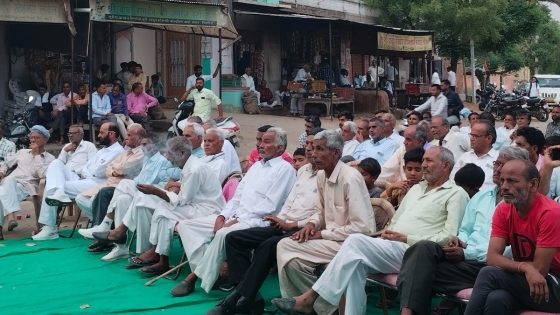As the crucial Lok Sabha polls are just around the corner, Jhunjhunu in the Shekahawati region of Rajasthan is one of the key Lok Sabha constituencies to watch out for. Jhunjhunu, sharing borders with Haryana, is one of the 25 Lok Sabha constituencies in the state. The election campaign here has oscillated between contentious and subdued tones.
At the heart of this fight are two key candidates — Shubh Karan Chaudhary of BJP and Brijendra Singh Ola of the Congress. As the election day nears, the fight between the two candidates shows no signs of conclusion, promising an enthralling final leg.
BJP VS CONGRESS
Chaudhary and Ola’s campaign styles are as contrasting as chalk and cheese. Chaudhary is unabashedly enjoying his controversial remarks on various issues, invoking the Sanatan ideology at every stage. His proclamation that a vote for Jhunjhunu is not for merely a constituency, but for the country and its robust leadership with Prime Minister Modi at the helm, has added a nationalistic undertone to the subdued politics in the constituency.
Ola, on the other hand, an MLA from the Jhunjhunu Vidhan Sabha, one of the eight assembly constituencies within Jhunjhunu Lok Sabha, is more attuned to local issues. His campaign pitches elaborate on his accomplishments, including provision of drinking water, and addressing connectivity concerns by building roads reaching remote villages and regions.
GROUND ISSUES
During a ground report, India Today team unearthed an alarming array of issues plaguing both the rural and urban regions of the Khetri assembly in the Jhunjhunu Lok Sabha constituency. Despite the visible lack of infrastructure and precarious road conditions, what struck us was not the absence of development but the deprivation of basic necessities. Locals find their existence marred by a number of difficulties. With scarce streetlights on poorly maintained roads, their evenings are reduced to a dreary journey back home. The absence of reliable transportation to connect the villages to local centers only amplifies their plight.
The lack of drinking water further compounds these grievances.
However, the most detrimental concern voiced by the locals is the rampant joblessness that is crippling the area. The region, known for providing the armed forces with a significant number of recruits, is now a disillusioned lot. The introduction of the ‘Agniveer scheme’ by the central government, which has resulted in a steep decline in recruitment, has resulted in widespread disappointment among the young people who had aspired to serve in the army.
The ongoing scenario in the Hindustan Copper Limited’s Kolihan copper mines only darkens the grim picture of unemployment. Around two decades ago, the mines offered employment to approximately 25,000 individuals. However, due to the alleged neglect by the local representatives, the mines are on the verge of closing down, leaving barely a few hundred individuals with their jobs intact.
The region is also grappling with inadequate medical and educational facilities. Amid the glaring issues of job security and connectivity, basic amenities such as health centres and schools are often forgotten. The problems are endless, the complaints abound, and the pleas for help go unheard. The angsh and deuisolation of the locals underline the need for immediate intervention. Their woes paint a clear picture of the dire state of affairs in the Khetri assembly, a region in desperate need of attention and swift action.
ELECTORAL LANDSCAPE
The electoral landscape of Jhunjhunu goes beyond mere political issues. The seat epitomizes the rich and complex caste dynamics that typically characterize the Hindi heartland’s political panorama. Jhunjhunu’s mapping is fundamentally informed by its multi-layered caste demographics, with the Jat community having a significant presence. Their numbers have prompted both leading political parties – BJP and the Indian National Congress – to field candidates from the Jat community exclusively.
The constituency, having a hefty voter base of approximately 20 lakh, beholds the Jats as a potent force with an astounding 4.4 lakh voter share.
The Rajputs trail them with an impressive 2.1 lakh voter share. Other substantial voter sections include the Scheduled Castes with 3 lakh votes, Muslims, and Malis, each with 2 lakh voters, followed by the Brahmins and Gurjars who muster up around 1.2 lakh and 1 lakh votes respectively.
The ever-evolving political dynamics in this Lok Sabha constituency further add weight to its significance. Results from the Assembly elections in 2023 witnessed some interesting twists. The Congress managed to secure victory in 6 out of 8 assembly seats, albeit the overall state saw a BJP-majority government.
The latter could only manage success in Khetri and Nawalgarh assembly constituencies.
In terms of vote share, Congress held 42.6% while BJP secured 38.6%.
However, in the 2019 general elections, the BJP led by comfortable margins across all eight assembly constituencies, securing a sweeping 61.7% of the votes, dwarfing Congress’s 36.9%. Jump back to 2014, the Lok Sabha election saw the BJP clinch the Jhunjhunu seat with 48.4% vote share, while Congress lagged behind with 25.3%. Interestingly, an independent candidate managed to garner more than 20% of the votes, indicating the electorate’s diverse political leanings.
Source Agencies



